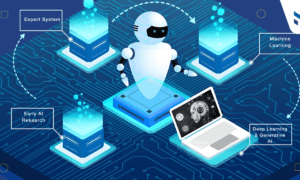Welcome to the world where science fiction turns into reality – Artificial Intelligence (AI). From self-driving cars to personalized recommendations, AI is revolutionizing industries and transforming our lives. But have you ever wondered about the limitations and challenges that come hand-in-hand with this cutting-edge technology? Brace yourself as we unravel the mysteries behind AI’s current capabilities and explore the obstacles it faces in reaching its true potential. Join us on this enlightening journey as we peel back the layers of artificial intelligence, exposing both its triumphs and tribulations. It’s time to dig deep into the realm of AI, uncovering what makes it tick while uncovering some fascinating discoveries along the way.
Introduction to AI
Artificial intelligence (AI) is one of the most transformational technologies of our time. With its ability to learn and improve through experience, AI has the potential to impact nearly every aspect of our lives.
Despite all the hype around AI, there are still many limitations and challenges that need to be addressed. In this article, we’ll take a look at some of the most significant limitations and challenges facing AI today.
One of the biggest challenges facing AI is incorporating common sense into algorithms. For example, a human child knows not to touch a hot stove without being taught because it’s common sense. However, an AI algorithm would have no way of knowing this unless it was explicitly programmed or learned from experience.
Another challenge facing AI is data bias. When training an AI system on data sets that contain biased information, the AI system will likely inherit and amplify those biases. This can lead to serious real-world consequences, such as discrimination against certain groups of people.
AI systems also tend to struggle with ambiguity and uncertainty. For example, humans can usually quickly identify an object even if it’s partially hidden or obscured in some way. But for an AI system, something that is partially hidden may as well be completely hidden. This limitation can make it difficult for AI systems to deal with real-world scenarios where information is incomplete or uncertain.
Another big challenge for AI is dealing with changing or dynamic environments. While humans are able to adapt relatively easily to new situations, AI systems can get “stuck” if the environment they are in suddenly changes. This could lead to catastrophic consequences in a safety-critical application such as self-driving cars.
Finally, AI systems can be vulnerable to malicious attacks. By exploiting certain weaknesses or vulnerabilities, hackers or malicious actors can cause an AI system to act unpredictably or take unwanted actions that could have far-reaching and potentially dangerous implications.
Despite these challenges, the importance of continuing to develop and advance AI technologies is clear. With proper research and development, the potential for AI to radically improve our lives is immense.
Current Limitations of AI
Despite the great strides that have been made in artificial intelligence (AI) technology, there are still many limitations to its current state. One of the biggest challenges is AI’s ability to effectively process and understand natural language. This is an area of active research, but current AI systems often struggle with understanding the complexities of human language, especially when it is used in different ways by different people. Another challenge is AI’s ability to learn from small data sets. Deep learning algorithms, which are a type of AI, require large amounts of data in order to learn and improve. However, many real-world problems do not have access to the requisite data sets; for these problems, other methods of AI must be used. Additionally, AI systems often struggle with explainability; that is, they can arrive at correct solutions but have difficulty explaining how they arrived at those solutions. This lack of explainability can make it difficult for humans to trust AI systems and can limit their use in sensitive or high-stakes situations. AI technology is often expensive and inaccessible, making it out of reach for many individuals and organizations.
These challenges are not insurmountable, but they do present significant obstacles to the effective use of artificial intelligence. Researchers are actively working to overcome these limitations, but it will likely be some time before AI systems are able to rival human intelligence across all domains.
Challenges in Implementing AI
There is no question that artificial intelligence (AI) has the potential to revolutionize many industries and aspects of our lives. However, there are also significant challenges that need to be addressed in order for AI to reach its full potential.
One of the biggest challenges is simply the sheer amount of data that is needed to train AI algorithms. This data can be difficult and expensive to obtain, especially for companies that are just starting out with AI. In addition, even when data is available, it may not be clean or well organized, which can make it challenging to work with.
Another challenge is dealing with different types of data. For example, images and videos are often unstructured and can be difficult for machines to understand. Language is another area where there can be a lot of ambiguity and nuance that is hard for AI algorithms to deal with.
It is important to remember that AI is still in its early stages of development and there are bound to be unforeseen challenges that arise as we continue to explore its potential.
Application of AI in different industries
The potential of artificial intelligence (AI) has been harnessed in a number of different industries, with varying degrees of success. Perhaps the most well-known application of AI is in the field of robotics, where robot workers are increasingly being used in manufacturing and other industrial settings. But AI is also being used in other industries such as healthcare, finance, transportation, and even music.
In healthcare, AI is being used to develop new drugs and to diagnose diseases. In finance, AI is being used to develop better investment strategies and to prevent fraud. In transportation, AI is being used to develop self-driving cars and to improve traffic flow. And in music, AI is being used to create new songs and compositions.
While there are many potential applications for AI, there are also some limitations and challenges that need to be addressed. One challenge is that AI systems often require a lot of data in order to learn and operate effectively. Another challenge is that AI systems can sometimes be biased against certain groups of people if the data they are based on is itself biased. There is always the risk that an AI system may malfunction or make mistakes, which could have harmful consequences.
Ethical Issues with AI
When it comes to ethical issues with AI, there are a few key concerns that stand out. One is the question of who is responsible when things go wrong. If a self-driving car gets into an accident, for example, who is to blame? The answer isn’t always clear, and it raises ethical concerns about how we assign responsibility in an increasingly automated world.
Another concern is the question of data privacy. As AI relies on large data sets to learn and improve, there is a risk that personal data could be mishandled or even stolen. This could have serious implications for people’s privacy and safety.
There are also worries about the impact of AI on jobs. As AI gets better at completing tasks that humans can do, there is a risk that it could put people out of work. This could lead to social unrest and increased inequality.
There are concerns about the future of AI itself.Some experts worry that as AI gets smarter and more powerful, it could eventually surpass human intelligence. This could create unforeseen risks and challenges that we may not be able to control.
Conclusion
Overall, artificial intelligence has come a long way in revolutionizing the way we live our lives. We can only imagine where it might lead in the future. However, despite its potential and progress made so far, AI still faces limitations and challenges that hinder its further development . There will need to be substantial advances made in areas such as computing power and data management before AI can reach its full potential. Undoubtedly, once these barriers are overcome, artificial intelligence will no doubt represent an increasingly valuable asset to humanity’s capabilities for years to come.



































